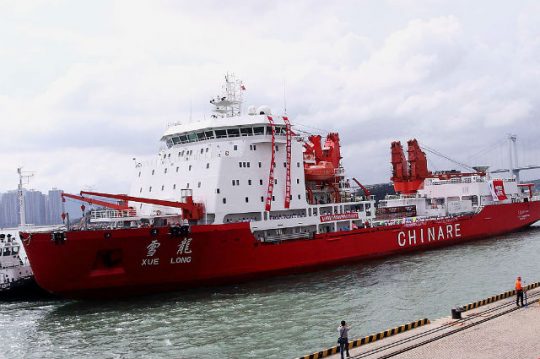Secretary of State Mike Pompeo is traveling to Finland over the weekend to attend the 11th Arctic Council Ministerial meeting, where representatives from the eight Arctic states will address a host of issues affecting the polar region. The agenda will be jam-packed, with senior officials set to discuss everything from development to environmental protection to military matters. One topic that deserves special attention is China's increasingly concerning role in the Arctic, where Beijing appears to have ambitious economic and military plans that should worry the United States.
On Thursday, the Department of Defense released its annual report to Congress on Chinese military power. The document makes clear that the Pentagon is more worried about China's activities in the region than ever before. In fact, as Fox News notes, the report mentions the word "Arctic" 21 times, while last year the same assessment only mentioned the word "Arctic" once.
The Pentagon describes how, since gaining observer status on the Arctic Council in 2013, China has increased its activities in the region. Most notably, in January 2018, the Chinese State Council Information Office for the first time issued a white paper on Beijing's Arctic policy, declaring China to be a "Near-Arctic State" and promoting a "Polar Silk Road" through the region.
"China is an important stakeholder in Arctic affairs. Geographically, China is a 'Near-Arctic State,' one of the continental states that are closest to the Arctic Circle," the paper said. "The natural conditions of the Arctic and their changes have a direct impact on China's climate system and ecological environment, and, in turn, on its economic interests in agriculture, forestry, fishery, marine industry, and other sectors."
The paper also described how China shares "interests with Arctic States" and hopes to "jointly build a 'Polar Silk Road,' and facilitate connectivity and sustainable economic and social development of the Arctic."
Still, China also stated that, ultimately, it is in the Arctic to "pursue its own interests." To that end, China outlined four focuses in the region, according to the Diplomat: developing shipping routes to build its "Polar Silk Road" and encourage trade; exploring and exploiting oil, gas, mineral, and other non-living resources, as well as nontraditional energy sources such as geothermal, wind, and other clean energy resources; using fisheries and other living resources and participating in conservation; and developing Arctic tourism.
So China went to work in the Arctic, seeking to quench its insatiable thirst for resources. As usual, however, China's seemingly benign economic projects are part of a larger geopolitical agenda—and one with very serious military implications. It is important to remember that Chinese projects focused on development always serve the additional purpose of expanding China's economic and political influence, from South America to Africa, and beyond. But American officials have also expressed concern about China's military ambitions in the Arctic. "[The Chinese are] certainly creating the potential, should they wish to do so in the future, to use military capabilities in the Arctic," a senior official in the Trump administration said in February. "We see Iceland as a place where the Chinese would like to develop a bridgehead, including through port capabilities, and doing so would position Iceland to be a natural hub for China vis-a-vis the Arctic." In other words, Washington fears that Beijing seeks "bridgeheads" in Europe, to influence waters dominated by NATO, which has also expressed concern about China's activities in the Arctic.
This brings us back to the Pentagon's newly released report, which highlights how China's growing fleet of icebreakers and civilian research stations in Iceland and Norway could bolster the Chinese military posture in the region. "Civilian research could support a strengthened Chinese military presence in the Arctic Ocean, which could include deploying submarines to the region as a deterrent against nuclear attacks," the report states. Other members of the Arctic Council besides the United States, including Denmark, have expressed concerns about China's growing role in the polar region.
American officials are right to be concerned about China's activities in the Arctic, which could pose a serious threat in the coming years. In its report, the Pentagon describes a Chinese military seeking to build a "world-class" force over the next 30 years, which should be viewed as part of Beijing's larger goal of supplanting the United States as the preeminent power in the Indo-Pacific region and, eventually, the world. China's ambitious plans for the Arctic fit well into that vision, providing the Chinese with more resources and strategic influence. China's role in the Arctic could very well prove to be an overlooked issue that ultimately plays a pivotal role in future geopolitics. The United States should be paying attention.
